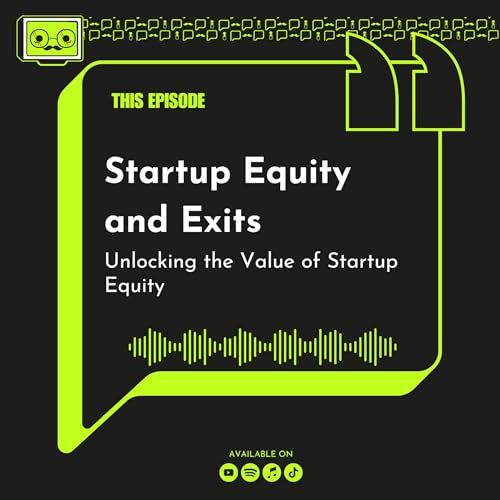
105 - Startup Equity and Exits. Unlocking the Value of Startup Equity.
No se pudo agregar al carrito
Add to Cart failed.
Error al Agregar a Lista de Deseos.
Error al eliminar de la lista de deseos.
Error al añadir a tu biblioteca
Error al seguir el podcast
Error al dejar de seguir el podcast
-
Narrado por:
-
De:
On this episode, we have Raphael Quisumbing, Miguel Fermin, and Jason Tores joining us to discuss the world of startup equity and exits.
For anyone working at or dreaming of joining a startup, understanding equity is crucial. This episode demystifies the world of stock options, vesting schedules, and company valuation. Our guests will break down how startup equity works, the key terms you need to know, and what happens during a successful exit, whether through an acquisition or an IPO. We'll share practical advice on how to navigate compensation conversations and maximize the value of your stake in a growing company.
What are the fundamental types of equity an employee can receive, and what’s the difference between them? (Generalization)
The two most common types are stock options and restricted stock units (RSUs). With stock options, you get the right to buy a certain number of shares at a predetermined price, called the strike price, after a vesting period. RSUs, on the other hand, are a grant of actual shares that are given to you once they vest. The key difference is that with options, you have to pay to acquire the stock, while with RSUs, the stock is simply given to you.
What is a vesting schedule, and why is it so important for employees to understand? (Generalization)
A vesting schedule is the timeline that determines when an employee gets ownership of their equity. It's usually a four-year schedule with a one-year cliff, meaning you have to work for at least a year before you get any of the equity. After that, the rest of the equity typically vests in monthly increments. Understanding your vesting schedule is crucial because it dictates when your equity is truly yours, and it heavily influences decisions like when to leave a company or whether to exercise your stock options.
How do mergers, acquisitions, and IPOs impact employee equity? (Generalization)
In a merger or acquisition, employee equity is typically cashed out or converted into shares of the acquiring company. The terms of the deal can vary, so it's essential to understand the specific agreement. In an Initial Public Offering (IPO), the company's shares become available on the public stock market. This allows employees to sell their vested shares for cash, subject to a lock-up period that prevents an immediate sell-off. Both events represent the primary ways for employees to realize the financial value of their equity.
What are some key questions employees should ask about equity during a job negotiation? (Generalization)
When negotiating for equity, you should always ask about the type of equity being offered (e.g., options or RSUs). It’s also crucial to understand the vesting schedule and any performance-based conditions. Inquire about the company's latest valuation and the total number of shares outstanding, as this helps you calculate the actual percentage of the company your equity represents. Finally, ask about the company’s path to an exit (e.g., IPO or acquisition) and any policies regarding exercising your options if you leave the company.


